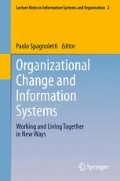Abstract
The dynamic evolution of competences required by professions has to match ever-evolving contexts, in which the growth of the demand of new professionals, poses the threat of a skill shortage. The role of learning and training is strategic to this regard, also thanks to the use of on-line and distance learning that use Internet based technologies to allow learning to be administered in context different than the traditional face-to-face. Literature highlights that e-learning has to be implemented following specific strategies. Within this perspective, this chapter presents and discusses the recent experiences of the public policies for e-learning in Italy.
Access this chapter
Tax calculation will be finalised at checkout
Purchases are for personal use only
References
Khan, B. H. (1997). Web-based Instruction: What is it and why is it? In B. Khan (Ed.), Web-based Instruction. Englewood Cliffs: Educational Technology Publications.
Wang, Y. (2003). Assessment of learner satisfaction with asynchronous electronic learning systems. Information and Management, 41, 75–86.
Khan, Badrul H. (2001) A framework for web-based learning. Web-based training, 75–98.
Nichols, M. (2003). A theory of e-learning. Educational Technology and Society, 6, 1–10.
Urdan, T., & Weggen, C. (2000) .Corporate e-learning: exploring a new frontier. WRHAMBRECHT +CO.
Cohen, E. B., & Nycz, M. (2006). Learning objects and e-learning: an informing science perspective. Interdisciplinary Journal of Knowledge and Learning Objects, 2, 23–34.
Za, S., & Braccini, A.M. (2012). Designing 3D virtual world platforms for e-learning services. New Frontiers of Organizational Training. In Snene, M. (Ed.) IESS 2012, LNBIP 103, pp. 284–296. London: Springer.
Dalsgaard, C. (2006). Social software: e-learning beyond learning management systems. European Journal of Open, Distance and E-Learning, 2.
Kemp, J., & Livingstone, D. (2006). Putting a Second Life “Metaverse” Skinon Learning Management Systems. Proceedings of the Second Life Education Workshop at the Second Life Community Convention, pp. 13–18, San Francisco.
Dabbagh, N. (2005). Pedagogical models for e-learning: a theory-based design framework. International Journal of Technology in Teaching and Learning., 1, 25–44.
Hannafin, M. (1992). Emerging technologies, ISD, and learning environments: critical perspectives. Educational Technology Research and Development, 40, 49–63.
Knoweldge, J. (2000). Distributed learning evolves to meet needs of lifelong learners. Education Edition, 1, 1–15.
Rogoff, B. (1994). Developing understanding of the idea of communities of learners. Mind, Culture, and Activity, 4, 209–229.
Ke, F., & Hoadley, C. (2009). Evaluating online learning communities. Educational Technology Research and Development, 57, 487–510.
Yin, R. K. (1994). Case study research: design and methods. CA: Sage Publishing.
Author information
Authors and Affiliations
Corresponding author
Editor information
Editors and Affiliations
Rights and permissions
Copyright information
© 2013 Springer-Verlag Berlin Heidelberg
About this chapter
Cite this chapter
Mosconi, E.M., Silvestri, C., Poponi, S., Braccini, A.M. (2013). Public Policy Innovation in Distance and On-Line Learning: Reflections on the Italian Case. In: Spagnoletti, P. (eds) Organizational Change and Information Systems. Lecture Notes in Information Systems and Organisation, vol 2. Springer, Berlin, Heidelberg. https://doi.org/10.1007/978-3-642-37228-5_37
Download citation
DOI: https://doi.org/10.1007/978-3-642-37228-5_37
Published:
Publisher Name: Springer, Berlin, Heidelberg
Print ISBN: 978-3-642-37227-8
Online ISBN: 978-3-642-37228-5
eBook Packages: Business and EconomicsBusiness and Management (R0)

